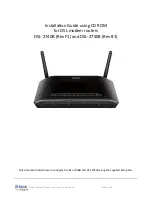
109
Performing Switch Administration
Information About Performing Switch Administration
Default MAC Address Table Configuration
Address Aging Time for VLANs
Dynamic addresses are source MAC addresses that the switch learns and then ages when they are not in use. You can
change the aging time setting for all VLANs or for a specified VLAN.
Setting too short an aging time can cause addresses to be prematurely removed from the table. Then when the switch
receives a packet for an unknown destination, it floods the packet to all ports in the same VLAN as the receiving port.
This unnecessary flooding can impact performance. Setting too long an aging time can cause the address table to be
filled with unused addresses, which prevents new addresses from being learned. Flooding results, which can impact
switch performance.
MAC Address Change Notification Traps
MAC address change notification tracks users on a network by storing the MAC address change activity. When the switch
learns or removes a MAC address, an SNMP notification trap can be sent to the NMS. If you have many users coming
and going from the network, you can set a trap-interval time to bundle the notification traps to reduce network traffic.
The MAC notification history table stores MAC address activity for each port for which the trap is set. MAC address
change notifications are generated for dynamic and secure MAC addresses. Notifications are not generated for self
addresses, multicast addresses, or other static addresses.
Static Addresses
A static address has these characteristics:
Is manually entered in the address table and must be manually removed.
Can be a unicast or multicast address.
Does not age and is retained when the switch restarts.
You can add and remove static addresses and define the forwarding behavior for them. The forwarding behavior defines
how a port that receives a packet forwards it to another port for transmission. Because all ports are associated with at
least one VLAN, the switch acquires the VLAN ID for the address from the ports that you specify. You can specify a
different list of destination ports for each source port.
A packet with a static address that arrives on a VLAN where it has not been statically entered is flooded to all ports and
not learned.
You add a static address to the address table by specifying the destination MAC unicast address and the VLAN from
which it is received. Packets received with this destination address are forwarded to the interface specified with the
interface-id
option.
When you configure a static MAC address in a private-VLAN primary or secondary VLAN, you should also configure the
same static MAC address in all associated VLANs. Static MAC addresses configured in a private-VLAN primary or
secondary VLAN are not replicated in the associated VLAN.
Feature
Default Setting
Aging time
300 seconds
Dynamic addresses
Automatically learned
Static addresses
None configured
Summary of Contents for IE 4000
Page 12: ...8 Configuration Overview Default Settings After Initial Switch Configuration ...
Page 52: ...48 Configuring Interfaces Monitoring and Maintaining the Interfaces ...
Page 108: ...104 Configuring Switch Clusters Additional References ...
Page 128: ...124 Performing Switch Administration Additional References ...
Page 130: ...126 Configuring PTP ...
Page 140: ...136 Configuring CIP Additional References ...
Page 146: ...142 Configuring SDM Templates Configuration Examples for Configuring SDM Templates ...
Page 192: ...188 Configuring Switch Based Authentication Additional References ...
Page 244: ...240 Configuring IEEE 802 1x Port Based Authentication Additional References ...
Page 298: ...294 Configuring VLANs Additional References ...
Page 336: ...332 Configuring STP Additional References ...
Page 408: ...404 Configuring DHCP Additional References ...
Page 450: ...446 Configuring IGMP Snooping and MVR Additional References ...
Page 490: ...486 Configuring SPAN and RSPAN Additional References ...
Page 502: ...498 Configuring Layer 2 NAT ...
Page 770: ...766 Configuring IPv6 MLD Snooping Related Documents ...
Page 930: ...926 Configuring IP Unicast Routing Related Documents ...
Page 976: ...972 Configuring Cisco IOS IP SLAs Operations Additional References ...
Page 978: ...974 Dying Gasp ...
Page 990: ...986 Configuring Enhanced Object Tracking Monitoring Enhanced Object Tracking ...
Page 994: ...990 Configuring MODBUS TCP Displaying MODBUS TCP Information ...
Page 996: ...992 Ethernet CFM ...
Page 1066: ...1062 Using an SD Card SD Card Alarms ...
















































